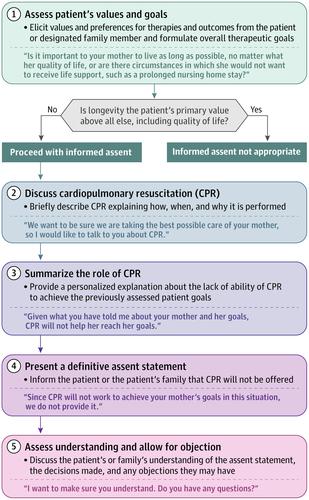JAMA ( IF 63.1 ) Pub Date : 2020-05-12 , DOI: 10.1001/jama.2020.4894 J Randall Curtis 1, 2 , Erin K Kross 1, 2 , Renee D Stapleton 3

|
The novel coronavirus disease 2019 (COVID-19) pandemic is challenging health care systems worldwide and raising important ethical issues, especially regarding the potential need for rationing health care in the context of scarce resources and crisis capacity. Even if capacity to provide care is sufficient, one priority should be addressing goals of care in the setting of acute life-threatening illness, especially for patients with chronic, life-limiting disease.
Clinicians should ensure patients receive the care they want, aligning the care that is delivered with patients’ values and goals. The importance of goal-concordant care is not new or even substantially different in the context of this pandemic, but the importance of providing goal-concordant care is now heightened in several ways. Patients most likely to develop severe illness will be older and have greater burden of chronic illness—exactly those who may wish to forgo prolonged life support and who may find their quality of life unacceptable after prolonged life support.1 In addition, recent reports suggest that survival may be substantially lower when acute respiratory distress syndrome is associated with COVID-19 vs when it is associated with other etiologies.2,3
In this context, advance care planning prior to serious acute illness and discussions about goals of care at the onset of serious acute illness should be a high priority for 3 reasons. First, clinicians should always strive to avoid intensive life-sustaining treatments when unwanted by patients. Second, avoiding nonbeneficial or unwanted high-intensity care becomes especially important in times of stress on health care capacity. Third, provision of nonbeneficial or unwanted high-intensity care may put other patients, family members, and health care workers at higher risk of transmission of severe acute respiratory syndrome coronavirus 2. Now is the time to implement advance care planning to ensure patients do not receive care they would not want if they become too severely ill to make their own decisions. As eloquently pointed out by an intensivist, “If you do not talk with [your family] about this now, you may have to have a much more difficult conversation with me later.”4 Several online resources can guide these advance care planning discussions.5-7
中文翻译:

在新型冠状病毒2019(COVID-19)期间解决预先护理计划和关于请勿进行复苏令的决定的重要性。
新型冠状病毒病2019(COVID-19)大流行正在全球范围内挑战卫生保健系统,并提出了重要的伦理问题,尤其是在资源短缺和危机承受能力背景下配给卫生保健的潜在需求方面。即使提供护理的能力足够,在优先考虑危及生命的疾病,特别是对于患有慢性,限制生命的疾病的患者中,护理的目标仍应优先解决。
临床医生应确保患者获得所需的护理,使提供的护理与患者的价值观和目标保持一致。在这种大流行的背景下,目标一致护理的重要性不是新的甚至是根本不同的,但是提供目标一致护理的重要性现在已经通过多种方式得到了提高。最有可能患上严重疾病的患者年龄较大,患有慢性疾病的负担也更大,恰恰是那些希望放弃延长生命支持以及在延长生命支持后可能无法接受生活质量的患者。1此外,最近的报告表明,当急性呼吸窘迫综合征与COVID-19相关时,其生存可能大大低于与其他病因相关的生存。2 ,3-
在这种情况下,出于以下三个原因,应优先考虑在严重急性疾病之前进行预先护理计划以及在严重急性疾病发作时就护理目标进行讨论。首先,当患者不愿意使用时,临床医生应始终努力避免进行密集的维持生命的治疗。其次,在对医疗保健能力产生压力的时候,避免无益或不必要的高强度医疗变得尤为重要。第三,提供无益或不必要的高强度护理可能会使其他患者,家庭成员和医护人员更容易传播严重急性呼吸道综合征冠状病毒。2.现在应该实施预先护理计划,以确保患者不会如果他们病得很重,无法做出自己的决定,他们会得到他们不希望得到的照顾。4一些在线资源可以指导这些高级护理计划讨论。5 -7











































 京公网安备 11010802027423号
京公网安备 11010802027423号